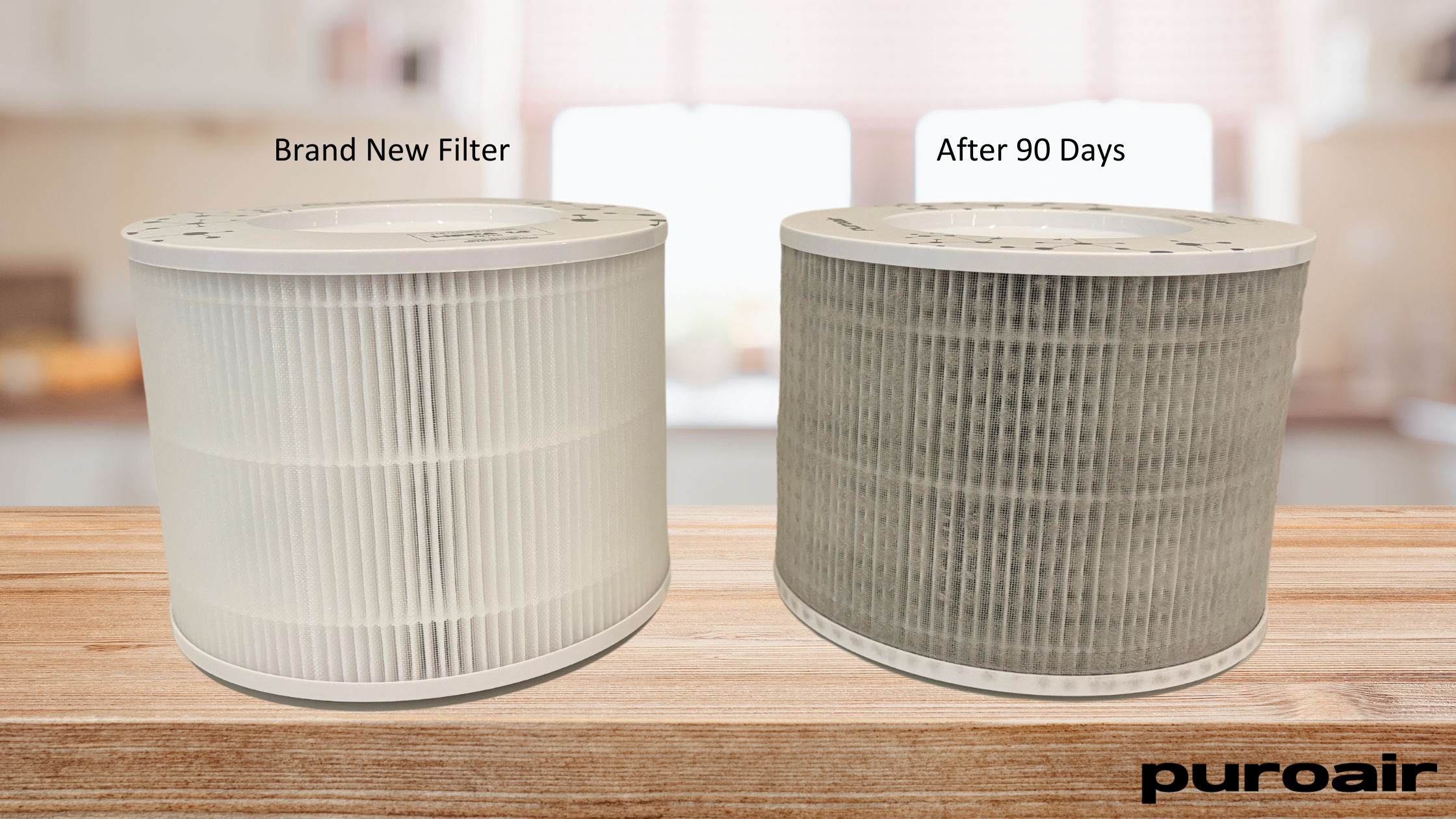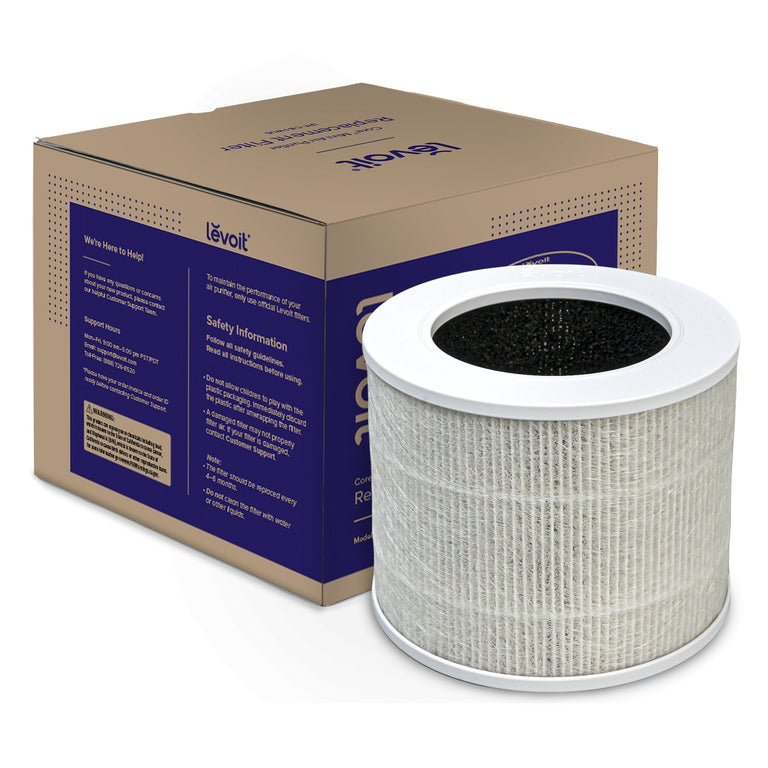Do Air Purifiers Need Replacement Filters? Essential Guide
Imagine breathing in the freshest air possible, right in the comfort of your home. Sounds ideal, doesn’t it?
Air purifiers promise just that—cleaner, healthier air. But here’s a question that might have crossed your mind: Do air purifiers need replacement filters? The answer could be the key to unlocking the full potential of your air purifier. By understanding how often you should replace the filters, you can ensure that your device works efficiently, keeping your indoor environment as clean as possible.
Dive into this article to discover why maintaining your air purifier is crucial for your health and how it can save you money in the long run. Stay with us as we unravel this essential aspect of air purifier maintenance that could change the way you breathe.

Credit: shop.sharpusa.com
How Air Purifiers Work
Air purifiers are essential for maintaining clean indoor air. Understanding how they work helps in choosing the right one. This knowledge also aids in knowing why filters need replacement.
Understanding The Filtration Process
Air purifiers use filters to trap dust and pollutants. As air passes through, filters catch harmful particles. This process cleans the air effectively.
Role Of The Fan In Air Circulation
A fan draws air into the purifier. It pushes air through the filters. This circulation ensures continuous cleaning of the air.
Importance Of Filter Types
Different filters target various pollutants. HEPA filters capture tiny particles. Carbon filters remove odors and gases. Each type plays a unique role.
Impact Of Filter Efficiency
Efficient filters maintain air quality. Over time, they become less effective. Regular replacement ensures continued purification.
Consequences Of Neglecting Filter Changes
Old filters reduce air purifier performance. They may allow pollutants to escape. Regular replacements prevent these issues.

Credit: www.reddit.com
Types Of Air Purifier Filters
Air purifiers are essential for maintaining clean indoor air. They come with different filters to remove pollutants. Understanding these filter types helps in proper maintenance. Each filter has unique features and benefits. Choosing the right one depends on your needs.
Hepa Filters
HEPA filters are popular for their efficiency. They remove up to 99.97% of particles. These include dust, pollen, and pet dander. HEPA filters are ideal for allergy sufferers. They need regular replacement for optimal performance. Usually, every 6 to 12 months.
Activated Carbon Filters
Activated carbon filters excel at removing odors. They trap gases and volatile organic compounds (VOCs). These filters are perfect for smokers or pet owners. They don’t capture particles like HEPA filters. Replacement is needed every 3 to 6 months.
Uv Light Filters
UV light filters kill bacteria and viruses. They use ultraviolet light to disinfect air. These filters don’t remove particles or odors. They work best when combined with other filters. UV bulbs need replacement every 12 months.
Ionic Filters
Ionic filters use charged particles to clean air. They attract and neutralize pollutants. These filters are quiet and energy-efficient. They don’t capture particles like HEPA filters. Some models require regular cleaning. Others need periodic replacement.
Signs Your Filter Needs Replacement
Dust accumulation, decreased airflow, and unpleasant odors indicate that air purifier filters need replacement. Regularly changing filters ensures cleaner air and efficient performance, preventing health issues. Keep an eye on filter indicators for timely replacements.
Air purifiers are fantastic tools for ensuring the air in your home is clean and fresh. However, they do require regular maintenance, especially when it comes to replacing their filters. But how do you know when it’s time to change that filter? Recognizing the signs can make all the difference in maintaining a healthy environment. Let’s dive into some clear indicators that your air purifier’s filter might need a replacement.Decreased Air Quality
Have you noticed that the air in your home isn’t as fresh as it used to be? If the air quality seems to have declined, despite having an air purifier running, it might be a sign that the filter is clogged. A clogged filter can’t trap pollutants effectively, leaving dust and allergens free to roam your living space. Take a moment to observe if anyone in your home is experiencing more allergies or respiratory issues. This could be a clue that your purifier’s filter isn’t doing its job anymore. Regularly testing your indoor air quality can also highlight this issue early.Unusual Odors
Have you ever walked into a room and been greeted by an unexpected odor? If your once odor-free environment is starting to smell off, it could be your air purifier signaling for help. Filters filled with dust and debris can start to emit unpleasant smells, similar to a vacuum cleaner bag that’s overdue for a change. Pay close attention to any lingering smells, especially after cooking or using cleaning products. If these odors persist despite using your air purifier, it’s time to check the filter. Swapping out the old filter for a new one can quickly restore freshness to your air.Increased Noise Levels
Have you noticed that your air purifier sounds like it’s working overtime? A sudden increase in noise levels can be a telltale sign that your filter is blocked. When the filter is clogged, the purifier has to work harder to pull air through, resulting in louder operation. Listen for unusual sounds like rattling or humming. If your purifier is louder than usual, it’s worth opening it up to inspect the filter. Replacing the filter can often return your purifier to its quiet, efficient self. Recognizing these signs can prevent bigger issues down the road. Keep your air purifier in tip-top shape, and enjoy the benefits of cleaner air in your home. Have you checked your purifier’s filter lately?Factors Affecting Filter Lifespan
Understanding the factors that affect the lifespan of air purifier filters is crucial for maintaining a healthy and efficient air quality system in your home. Not all filters are created equal, and their longevity can vary greatly based on several conditions. Are you maximizing your filter’s potential, or unknowingly shortening its life span?
Air Quality Conditions
The air quality in your area plays a significant role in how long your filter will last. If you live in a city with high pollution levels, your air purifier filter will likely need replacement sooner. Conversely, rural areas with cleaner air might allow your filter to last longer. Consider checking local air quality reports regularly to gauge the impact on your filter.
Usage Frequency
How often do you run your air purifier? If it’s on continuously, especially in heavily trafficked rooms, expect to replace filters more frequently. Even if you don’t use it daily, running it during peak pollution times or allergy seasons can make a difference. Think about your family’s habits and the time spent indoors to estimate your usage needs accurately.
Filter Type
The type of filter you choose significantly affects its lifespan. HEPA filters, known for their effectiveness, often last longer but can be more expensive. Carbon filters may require replacement more often, especially if used to remove odors or smoke. Make sure to read the manufacturer’s guidance on each type to understand their specific longevity and maintenance requirements.
Are you keeping tabs on these factors? Monitoring them closely will help you extend the life of your filters, saving you time and money in the long run. It’s worth asking yourself if a little extra attention to these details could improve your home’s air quality and your family’s health.
Benefits Of Regular Filter Replacement
Air purifiers are a staple in many homes, working tirelessly to keep the air clean and fresh. But did you know that regularly replacing the filters can significantly enhance their performance? The benefits of regular filter replacement extend beyond just clean air. They touch on aspects like improved efficiency and prolonged lifespan of the device. Let’s dive into these benefits and see why changing those filters is not just a chore but an essential practice.
Enhanced Air Quality
Replacing filters regularly ensures your air purifier is effectively removing pollutants. Over time, filters can become clogged with dust, pet dander, and other particles. This reduces their ability to trap new contaminants.
Think of your filter as a sponge. When it’s saturated, it can’t absorb anymore. Similarly, a full filter can’t capture additional pollutants. By changing it, you allow your purifier to function optimally, maintaining a healthier environment for you and your family.
Increased Efficiency
A clean filter means less work for your air purifier. When filters are clogged, the device has to work harder to push air through, consuming more energy and costing you more in electricity bills.
Imagine driving a car with a clogged air filter. The engine strains, using more fuel to maintain speed. The same principle applies to air purifiers. Regular filter changes keep your device running smoothly, saving you money and reducing environmental impact.
Prolonged Purifier Lifespan
Regular filter replacements can extend the life of your air purifier. Overworking a device with clogged filters can lead to wear and tear, reducing its lifespan.
Think back to a time when you didn’t maintain a device properly. It likely didn’t last as long as expected. By keeping up with filter changes, you prevent unnecessary stress on the purifier, ensuring it serves you well for years.
Are you making the most of your air purifier? Consider how often you change the filters. Small actions like this can lead to big improvements in air quality and device longevity.
Choosing The Right Replacement Filter
Air purifiers work effectively with clean filters. Regular replacement ensures optimum performance. Choose compatible filters to maintain air quality.
Choosing the right replacement filter for your air purifier is essential. Filters ensure your air purifier works efficiently. Without the right filter, your device might not clean the air properly. This choice can impact the air quality in your home. Let’s explore what to consider when choosing a replacement filter.Compatibility With Your Purifier
Check if the filter fits your air purifier model. Not all filters work with every device. Manufacturers often design filters for specific models. Using the wrong filter can reduce performance. Always refer to your purifier’s manual. This ensures you select the correct filter.Quality And Brand
Choose a filter from a reputable brand. Quality filters last longer and work better. Some brands use advanced technology for better air cleaning. Research customer reviews for insights on quality. A well-reviewed filter often indicates reliability. Quality filters can improve your air quality significantly.Cost Considerations
Consider the cost of replacement filters. Higher quality filters may cost more. Yet, they often last longer. Balancing cost and quality is key. Buying in bulk can sometimes reduce costs. Look for deals or discounts. This can make maintenance more affordable.Maintenance Tips For Air Purifiers
Air purifiers keep your indoor air fresh and clean. To function effectively, they require regular maintenance. Without proper care, their efficiency drops. Let’s discuss how to maintain your air purifier.
Regular Cleaning
Dust and particles can clog your purifier. Clean the exterior with a damp cloth weekly. Remove dust from vents and grills. This keeps airflow smooth and efficient.
Scheduled Filter Checks
Filters trap harmful particles. Check them every month. Replace filters as per manufacturer instructions. Some filters last longer than others. A timely check ensures healthy air.
Proper Placement
Place your air purifier in a central location. Avoid corners and behind furniture. Ensure there’s space around it for air circulation. This helps the purifier work best.

Credit: getpuroair.com
Frequently Asked Questions
How Often To Replace Air Purifier Filters?
Air purifier filters typically need replacement every 6-12 months. The frequency depends on usage and air quality. Regular replacement ensures optimal performance and clean air. Always check the manufacturer’s guidelines for specific recommendations. This helps maintain efficiency and prolongs the lifespan of your air purifier.
Can I Reuse Air Purifier Filters?
Most air purifier filters are not reusable. Reusing them can reduce efficiency and worsen air quality. Some models offer washable filters, but they require proper cleaning. Always follow the manufacturer’s instructions to ensure effective filtration and maintain air purifier performance.
What Happens If Filters Aren’t Replaced?
Failing to replace filters can lower air purifier efficiency. Dirty filters can’t trap pollutants effectively, reducing air quality. Over time, this can strain the purifier, potentially causing damage. Regular filter replacement is crucial for maintaining clean air and extending the life of your device.
Are All Air Purifier Filters The Same?
Air purifier filters vary in type and function. Common types include HEPA, carbon, and pre-filters. Each serves different purposes, such as trapping allergens or neutralizing odors. Always choose the correct filter type for your specific air purifier model for optimal results.
Conclusion
Air purifiers need regular filter changes for effective performance. Filters trap dust, allergens, and pollutants. A clogged filter reduces air quality. Check your purifier manual for replacement timing. Some filters last three months; others longer. Replacing filters improves air flow.
Cleaner air means a healthier home. Neglecting filter changes leads to poor purification. Always buy the right filter for your model. Regular maintenance ensures your air purifier works efficiently. Keep your indoor air fresh and safe. Prioritize filter replacement as part of your home routine.
Clean air is essential for well-being.



